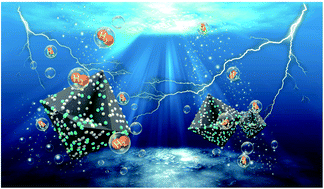MOF-assisted synthesis of octahedral carbon-supported PtCu nanoalloy catalysts for an efficient hydrogen evolution reaction†
Abstract
Highly efficient and stable Pt-based electrocatalysts have attracted significant attention for hydrogen generation via water splitting. However, the main obstacles in their industrial application are the scarcity and high cost of Pt resources. Herein, we proposed a novel confined replacement method to synthesize PtCu nanoalloys with molybdenum dioxide supported by a porous octahedral carbon matrix (PtCu–MoO2@C) via a metal–organic framework (MOF)-assisted strategy. Cu-based MOFs and MOF-derived octahedral carbon served as substrates to co-promote the formation and high dispersion of PtCu nanoalloys by the in situ reduction of Pt ions, resulting in fast electron transfer during the hydrogen evolution reaction (HER). As expected, our electrocatalyst requires very small overpotentials (24 mV in 1.0 M KOH and 42 mV in 0.5 M H2SO4) to achieve the current density of 10 mA cm−2. Moreover, it exhibits a superior mass activity (0.30 A mgPt−1 at −0.05 V in alkaline media and 0.49 A mgPt−1 at −0.05 V in acidic media), which is about 1.6 times that of commercial Pt/C catalysts, and high durability when compared with that of Pt/C, with a nearly 100% faradaic yield of hydrogen production. This synthetic strategy can provide new approaches to the design of noble metal-based electrocatalysts for future energy systems.



 Please wait while we load your content...
Please wait while we load your content...